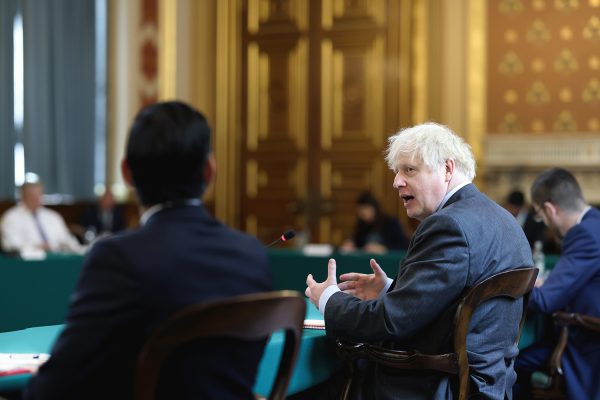
Boris Johnson may be remembered as the prime minister of Brexit and COVID parties.
British media have revealed a series of parties were held at the prime minister’s residence when the rest of the United Kingdom was in pandemic lockdown. Each week seems to bring fresh allegations and criticism. Three of Johnson’s predecessors have reprimanded him. Conservative backbenchers and party donors have urged him to step down. Labour has taken a 7- to 10-point lead in the polls. Yet Johnson continues in office.
The government first tried to defend the parties with what have been called “brazen” and “unbelievable” excuses. One involving wine, cheese and loud music was called a “work event”. A birthday party was defended as the prime minister being “ambushed by a cake.”
Police
Things took a darker turn when, in an obvious attempt to deflect criticism, Johnson accused the leader of the opposition, Keir Starmer, of failing to prosecute notorious pedophile Jimmy Savile when he was director of public prosecutions.
This is a conspiracy theory peddled by British neofascists without substance. Lawmakers of all parties condemned Johnson’s claim, however within days Starmer had to be given police protection from angry mobs who believed he had “protected pedophiles.” Police are investigating “serious and credible death threats” he and his family have received. Two British lawmakers have been assassinated in recent years.
On Friday, London’s Metropolitan Police announced it was also investigating several of the 10 Downing Street parties and had asked the prime minister and at least fifty of his aides to provide “reasonable” excuses for violating COVID-19 restrictions.
The prime minister may still be optimistic about his future, but if the police determine he broke the law it would become very difficult for him to stay in power.
Lawmakers wait
Conservative leadership challenges are held when 15 percent of lawmakers write letters of no-confidence to the so-called 1922 Committee, the parliamentary group of backbenchers.
Since the beginning of “partygate”, there has been a steady trickle of letters to the committee. It is believed many Conservatives are waiting for the police to wrap up their investigation before making up their minds.
The party may also be waiting to see how they fare in local elections in May. If they do better than expected, Johnson could gain a temporary reprieve. If they do badly, it might be the time to push Johnson out.
No obvious successor
Despite the Conservative Party’s reputation for dispatching unpopular leaders, there is no obvious replacement for Johnson. His successor could struggle to unite the party. Johnson brought in disaffected Labour voters with a populist economic policy, but that estranged traditional right-wing voters.
Even if he wins a leadership election but not by a wide margin, Johnson may decide he’s better off resigning. A victory would immunize him from another challenge for twelve months, but that is a time opponents could use to find and coalesce around just the “unity” candidate they now lack.
Scandal and sleaze
Conservatives have been in power for almost twelve years. They are experiencing what one minister described as “multiple organ failure”. The Downing Street parties come on top of allegations of corruption, including reports that a Conservative Party donor paid for the refurbishment of Johnson’s flat.
To older readers, it may sound familiar to the last time Conservatives had been in power a decade, when they were also brought down by unending revelations of scandal and sleaze.
